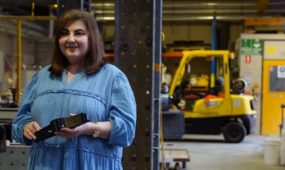Australia's only solar panel manufacturer receives $20 million financing from CEFC
Innovation
SOUTH Australia’s Tindo Solar is being provided up to $20 million senior debt finance from the Clean Energy Finance Corporation (CEFC) to locally manufacture, install and own rooftop solar arrays and sell the power to building occupants under a power purchase agreement (PPA).

Sign up to receive notifications about new stories in this category.
Thank you for subscribing to story notifications.
We spoke with Tindo Solar's Manager of People and Business Richard Inwood about what this financing means for Tindo – and what the future holds for Australian renewable manufacturers as investigations in to dumping of foreign products and ever-changing government opinion swirl around them.
“It's a sizeable amount of money, but it's just a beginning. It's very much designed to build sizeable national and international capacity and the manufacturing belts that come with that,” Inwood said.
The CEFC was established in 2012 to leverage taxpayer funds using a commercial approach to overcome market barriers and mobilise investment in renewable energy, energy efficiency and low emissions technologies.
“Building that capacity is the short to medium term vision. Nothing happens immediately. I think in three to six months we should have a second shift which is another 20 odd manufacturing jobs.”
If there ever was a true believer in Australia's capacity to make an industry of renewables, it's Richard Inwood. His job is to imprint the long term vision of the renewables sector in to Australia's mind, whether that be a homeowner looking to install an array, or a Federal Minister influencing policy at the highest levels.
“It's providing them with the vision that if we do it right we can create more jobs in this country – and right here, right now, renewable energy creates more jobs and has more jobs involved than all of oil, gas and coal combined.
“So what do we want? Do you want those kind of jobs, or do you want traditional, 100 year old business model type jobs based in crappy coal?”
Take your pick, says Inwood.
The PPA that Tindo offers is a fairly simple deal, but one that eliminates two of the most common complaints about installing solar panels.
One, Richard says, is absolute confusion and uncertainty about what to do and how to manage solar, as well as a real distrust of the business practices around it – “they've all seen the stories of businesses coming and going, crap product, all of that”. The second is the upfront cost.
Tindo's PPA means they install and own the solar panels at no cost to the customer, taking care of insurance, maintenance and management for the customer and selling them the cheaper energy on a fifteen year contract – which can be transferred to new property owners or renters, or bought outright if the customer so prefers.
“We'll give them 15 years on the product. It's ring-fenced. We know exactly the costs, the cost of manufacturing, financing, installation and maintenance. At the end of the term, they own the panels for another ten years of free energy.”
To put some numbers on it, Richard says the typical homeowner currently pays 35 to 40 cents a kilowatt-hour. Tindo's PPA runs on 23 cents plus GST for daytime energy, around a 30% discount, with a fixed rate of no more than 1% per annum increase – compared to AGL and Origin's recently announced 4.5%.
“The most important thing is that as we put in the extra capacity, our volume and our efficiency to manufacture is enhanced, which means our prices comes down, which means our competitiveness goes through the roof.
“That means we get widespread awareness and adoption of an Australian-made module compared to the imported stuff,” Inwood said.
“We look at what's imported – this year about $1.4 billion in solar panels, and if we replace 20% of that with an Australian made modules, we're talking about 600 manufacturing jobs. That's without overseas – and overseas is bigger again by some magnitude. That's a longer term vision.”
Tindo's home state, South Australia, should certainly be fertile ground for the company's new PPA. At the start of 2014, a quarter of homes already had panels installed.
Inwood sees the remaining three quarters as potential customers, especially as more people realise the benefit of hedging their bets against price increases on the grid.
Certain weeks have seen the majority of South Australia's energy supplied by renewables. Heatwaves, usually times of outages and high bills, have had their fangs pulled by solar arrays. Spikes and peaks on the grid have been all but flattened – something backed up by the recent Renewable Energy Target Review.
While he believes that Tindo's PPA erases their competition as price of entry is now zero, Inwood says there's still a fly in the soup for renewables: the grid.
“It's going to get nasty.”
Not that the grid can't handle it – there'll be plenty of power flowing. The kicker is that giants like AGL, Origin and SA Power Networks will see their margins start to shrink trying to go about the same business they've always done, and that's where the drama starts.
“They cannot keep putting up their supply charges because people will say, 'well f*** it, I'm going to go with more renewables now!' It's a death spiral.”
They're starting to turn, Inwood said, being supportive of storage research and probably embedding themselves with renewable energy businesses down the line to augment their profits, but it isn't happening easily – they're being dragged kicking and screaming.
“You're making $300 million a year which is SA Power Networks' net profit last year from South Australians – and it's just criminal. You can't keep doing that. Something has to change and it jolly well will. Renewables are not going away. It's just not going to happen.”
Tindo's spirits have been boosted by other news in the sector however. The Australian Government's Anti-Dumping Commission is soon due to report on an investigation into the alleged dumping of solar panels imported from China.
It follows anti-dumping actions undertaken in the US, Europe, India and beyond against dumping of Chinese panels at less than Chinese domestic prices or below the cost of manufacture.
“That was the death of the German solar manufacturing industry. Schott is gone. Q-Cells is gone. Conenergy is nearly going. Bosch is gone.”
There's a choice, Inwood believes: create a long-term, valuable, job creating industry – which Tindo is contending to be a part of – or allow the alleged dumping to continue and see Australia's renewable sector sacrificed as a result.
That's just one step of sorting out the industry's future according to Inwood and Tindo.
“We were number four in the world only a year ago in terms of our adoption and our research and place in renewable energy. Now we're number nine. In the last six months we spent $40 million on renewable infrastructure. The world spent $80 billion.”
It's a massive handbrake in investment, dropping the ball on a growing, clean, highly automated, innovation-driven industry – something that Australia should be play well at.
“Anti-dumping is just one part of the equation to tidy it up, straighten it out, make sure that we've good gear that actually works and lasts 25 years and performs as it says.”
It appears to him that the government, at least, is keen to enforce any findings that come out of the investigation.
“The review is still underway, almost at the end. Bob Baldwin, who is the Minister responsible for signing off on anti-dumping cases, said only hours ago that he and the Prime Minister were absolutely adamant they were going to use the anti-dumping laws that exist to the very edge of their ability – in other words as hard as they can.”
It's a vote of confidence for Tindo and the industry, but one that's not uniformly echoed throughout the senior levels of Government.
“They tried to stop the CEFC but I don't think that will happen now. Had they done that, this initiative, the $20 million and the industry funds of $200 million wouldn't have happened. That's not Open For Business at all. That's a handbrake to say the least – if not a bomb.”
Inwood – and the Ministers that believe in the industry's potential, which he says there are a few – have a big job trying to persuade some of the ideology which is missing the point. It might be up to Tindo, with their latest financing deal, to be the industry's poster child.
“The government loves success stories. They love job creation. If you would ask any minister – State, Federal, Local – what does the manufacturing look like in the future, they'll say 'it'll be innovative, automated, clean, efficient.'
“Well, that's Tindo. And we're showing right here, right now we can do it. Even though it's in difficult circumstances, even amongst alleged – not proven yet – dumped product being rife through the industry, we're still successful.”
“Three years later and we're still here. We have the longterm potential of $200 million plus in financing to go out and create even more jobs. It's a wonderful success story based in South Australia creating brand new manufacturing jobs for a State that desperately needs them, with a car industry that's about to piss off.”
Jump to next article



